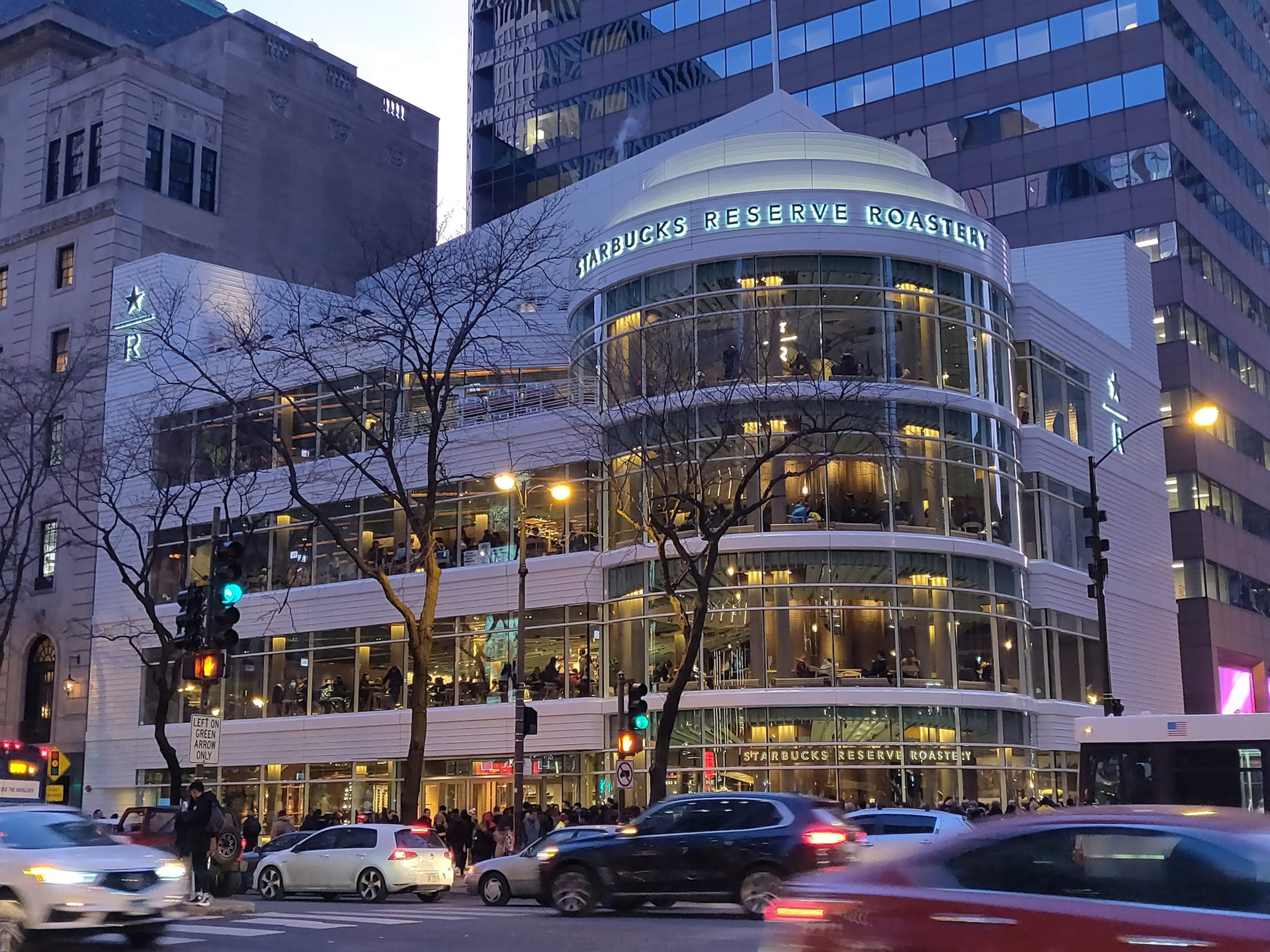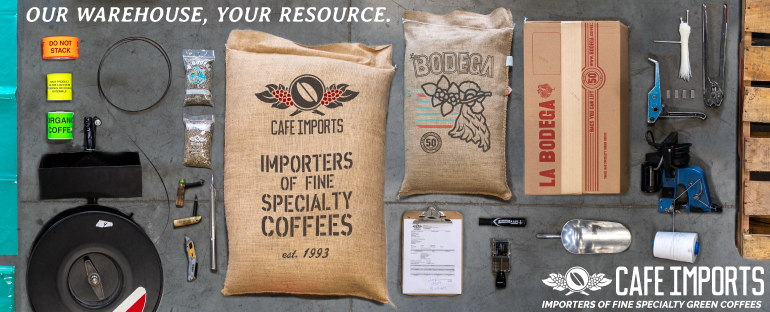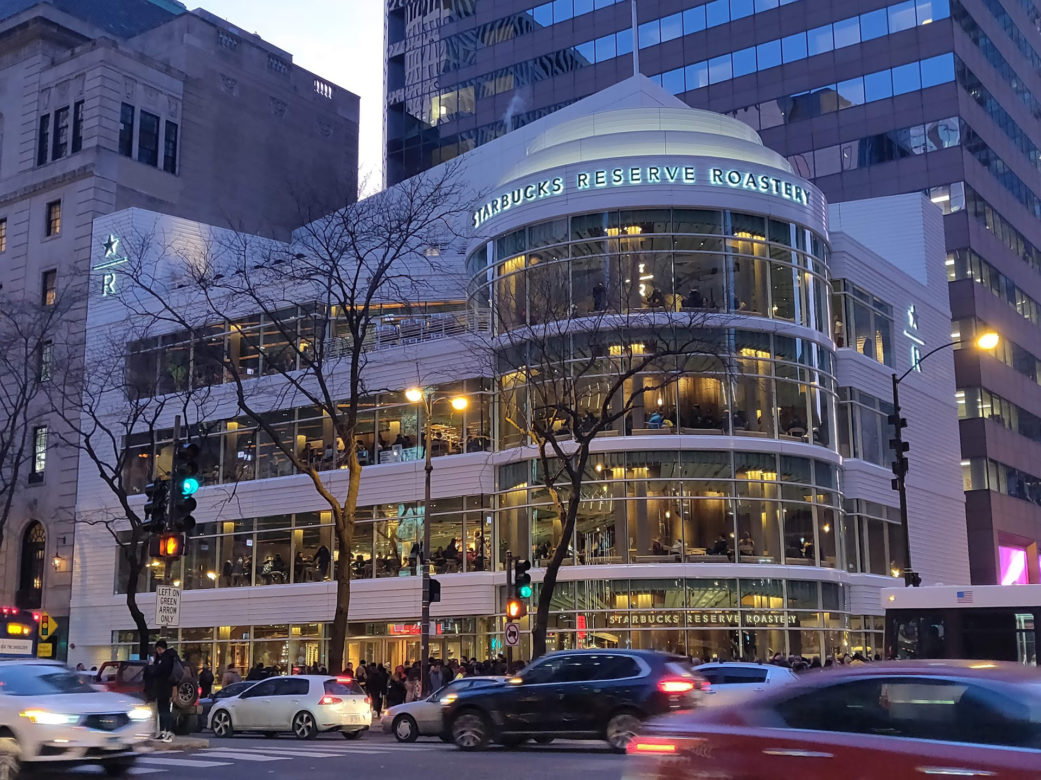
The roasting machine at the biggest Starbucks in the world is a khaki-colored Probat P25-2 named Charlotte Jackson. The staff—channeling the Kit Kat Klub in black and white, vests and ties, and felted H&M hats cocked in compliance with the Chicago health code—chose “Charlotte” in honor of the woman walking her dog on the label of Starbucks’ classic Gold Coast Blend. The flavor celebrated Starbucks’ expansion into the Windy City in 1987, while “Jackson” calls out the address of that first Chicago location. While Charlotte was never the dogwalker’s official name, the staff felt it expressed her specific je ne sais quoi, and management agreed.
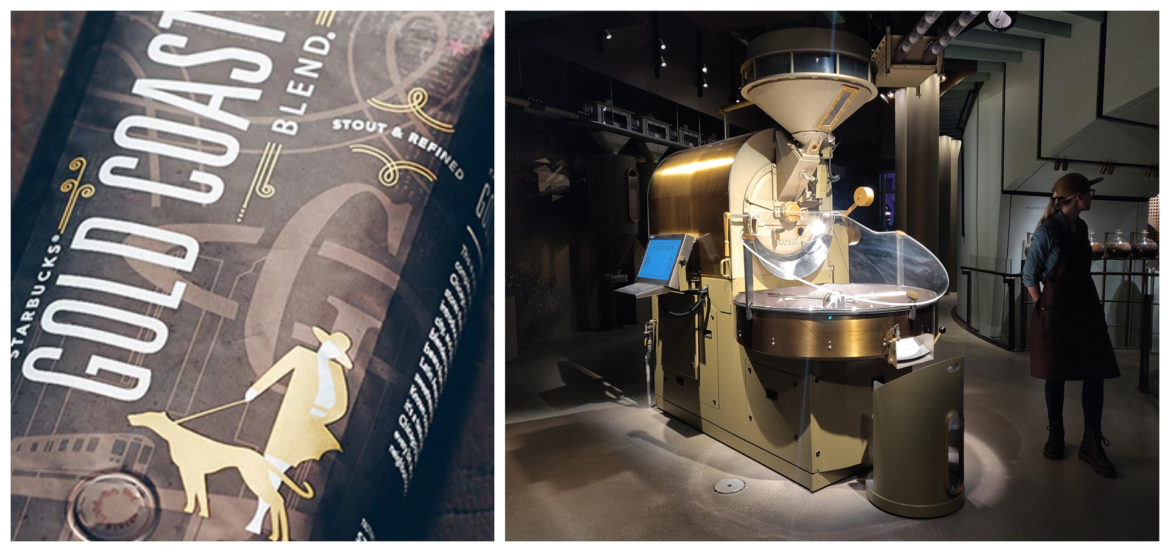
Charlotte Jackson greets you as you walk into the five-story Starbucks Reserve Roastery that opened on Chicago’s Magnificent Mile on November 15, 2019—the sixth such roastery worldwide, and for now, the largest Starbucks location on Earth. The roastery features four glass-enclosed floors (the fifth floor is the rooftop) that suggest a transparent tiered cake, each floor an indoor diorama of winter-beaten humans seeking heat and comfort. (November in Chicago is winter in Chicago, don’t @ me).
If Charlotte is the building’s ground-floor, immovable hearth, her visual twin is the roastery’s “cask”—a 56-foot cluster of parallel metal tubes shuttling roasted beans to each floor, each bean blend traveling up and down via its own gleaming beanstalk, then hurtling to various locations (bean silos, barista stations) via a web of smaller pneumatic tubes crisscrossing each ceiling. Every roastery has its own uniquely designed cask system; an employee (or “partner” as they are called) shared with me that Chicago’s cask is supposed to symbolize the sun, that the seafoam ceiling planks radiating out from the cask to the opposite end of the building represent the rays of the sun, and that the small light fixtures twinkling across the ceilings represent coffee beans, presumably the children of the sun.
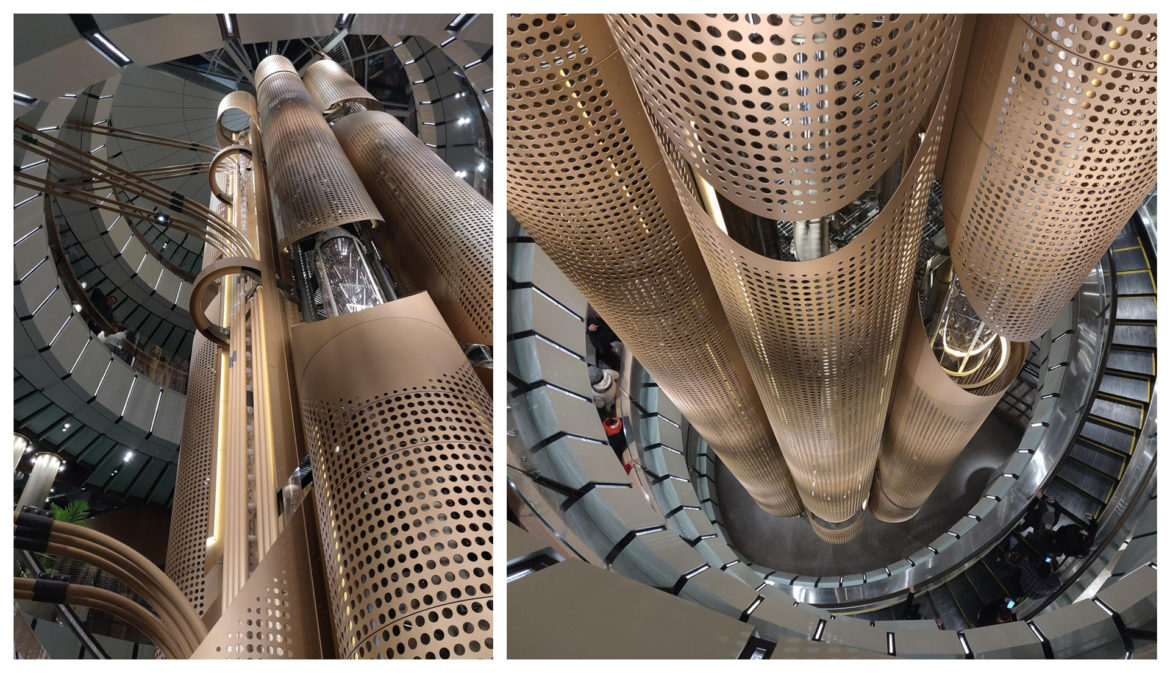
I admit I visited the Big Chungus of Starbucks to have some fun; imagining an event on the level of the Staples Logo Unveiling, I meant to vex the giant glass house with a few well-thrown scones. Starbucks has over 30,000 locations on six continents in 80 countries. If all 35,000 square feet of the Chicago structure can be counted as a coffee shop (and coffee is indeed served on each level), this Davos of the demitasse is not only the largest Starbucks location on the planet, but the largest coffee shop, period, dwarfing Riyadh’s Al Masaa.
Accordingly, when I arrived on opening day a bit before 5PM, I saw a 45-minute wait and two separate lines that folded around the block and doubled back on themselves to spare the sidewalks (the wait time was down from two hours; for the opening at 7AM over 1,000 people were in line). After regrouping inside one of the half-dozen normal Starbucks nearby, I came back at 6PM and began freezing in Line Two as the Starpartners supervising the crowd chanted, “Welcome to the chocolate factory of coffee!” Exactly 60 minutes later, I entered Versailles.
A little fireplace burns by the front door; burlap bags of beans rest fatly in the windows; and the giant beanstalks call to mind the Wonka factory or a theme park. The “Master Roaster” next to Charlotte Jackson holds forth to a crowd, blending the zeal of a circus ringmaster with the humility of a docent. The baristas, as noted, are out of a PG-rated Cabaret, bagging and brewing and ringing up coffee and Princi Italian pastries at the biggest countertops in the world; the music pulses as if you’re browsing in Zara; the mannequins wearing denim on denim invite you to reach for your wallet; and a glance out the window at Ferragamo, Burberry, and Ermenegildo Zegna inspires you to empty it.
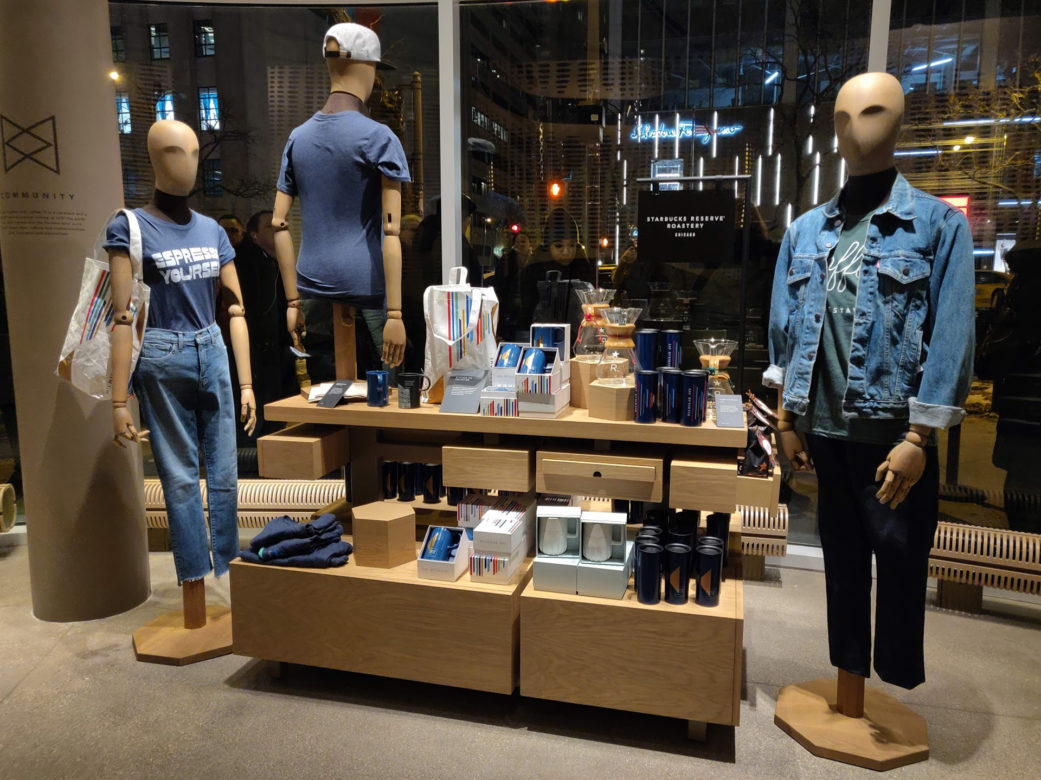
I always make my boy happy, I hear a mother say to her son as they walk toward the curved escalator. You know why? Because you’re my everything. Into a tan fabric shopping basket you can pack the contents of an entire trade show: branded Starbucks Reserve keychains, beanies, baseball hats, puzzles, stickers, coin purses, totes, and latte art stencil sets; journals, luggage tags, a “coffee passport,” and a hand-painted La Marzocco espresso machine; woven aprons, leather coasters, cuffs, and wallets from Seattle’s Hardmill; coffee technology ranging from grinders, siphons, pour-overs, and presses to French press stirrer timers and a temperature-controlled mug called an Ember, its travel tumbler priced at $149.95; and of course, coffee. Many of these items have “Starbucks Reserve” printed on them in case you forgot where you bought them (or how much you paid).
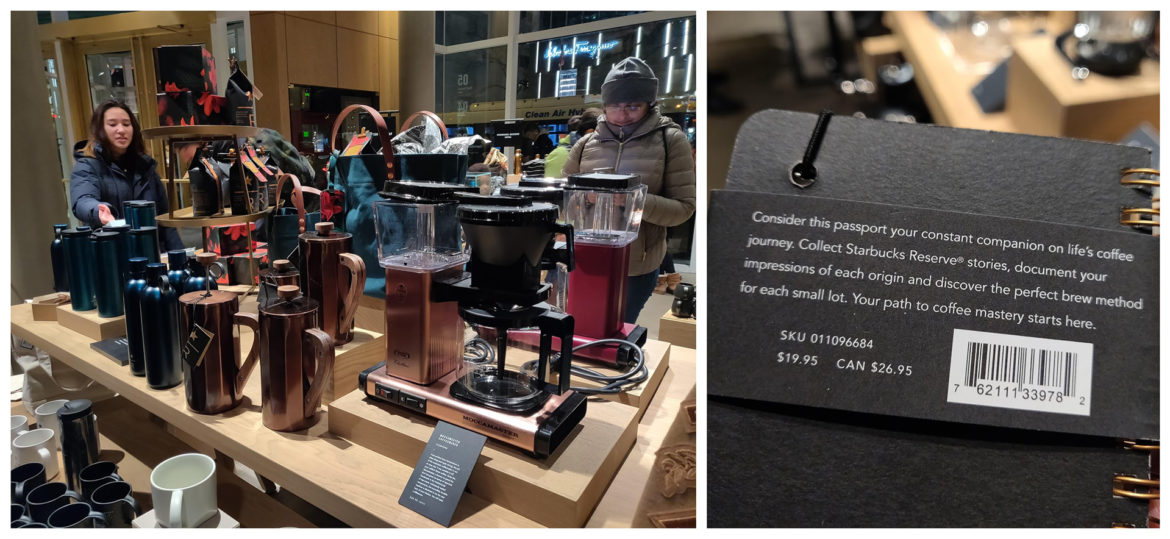
The biggest Starbucks in the world is also Starbucks’ shrine to itself, a laboratory to brew its own mythology in perpetuity. Beans rest in glass jars like capsules on an apothecary’s shelf. “WHAT IS CHAR?” asks one display, explaining the secret to barrel-aging coffee. Here, coffee is no longer water passed through beans; it is arcane potion and luxury indulgence, artistic statement and elixir of aspiration, credit card line item and divine mystery. Mud has arrived.
The mysteries multiply by the floor. On floor one, coffee is served in its most approachable forms: hot brew, cold brew, espresso. On floor two, it is served with thick-crusted, oil-dappled pizzas rustled up by the chefs of Princi Bakery; the line stretches all the way across the building, kitchen to cask. On floor three, where PETA is protesting the surcharge for vegan milks, lives the Experiential Coffee Bar, where you can try barrel-aged coffee, “flights” pairing cold brew with whiskey, mulled spiced coffee, coffee with truffles, and liquid nitrogen gelato. Facing yet another line of 45 minutes or longer, I text STARBUCKS to 78322 and within seconds I have auto-sent a petition to make soymilk free.
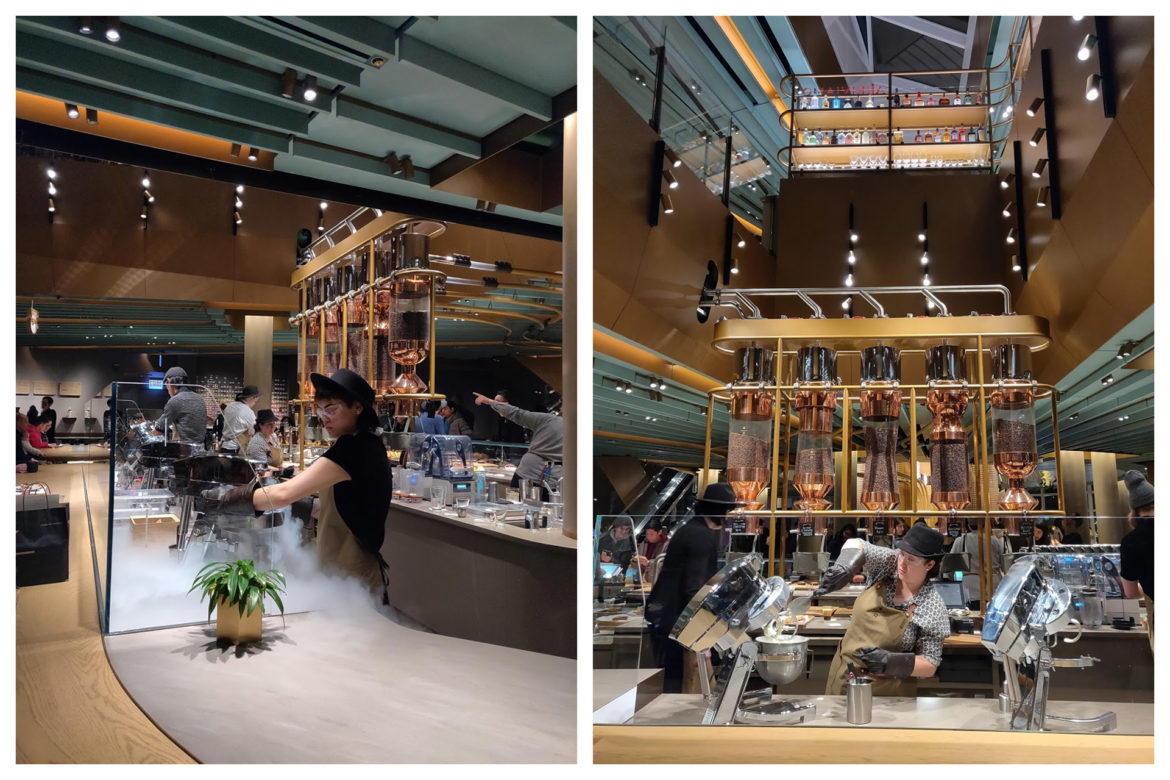
On floor four, at the Arriviamo Bar, coffee and booze take their relationship to the next level, pairing off in ways even PETA might approve of. Alongside martinis, Manhattans, and other classics, you can sample coffee-based cocktails, including the Chicago-specific, thirteen-ingredient Roastery Boilermaker, featuring Chicago’s infamous municipal liquor of record, Malört. Friends have warned me that Malört tastes like “burnt hairspray” and “floral gasoline,” but I have no chance to disprove this because at 8:50PM, I’m told it’s too long to get on the waitlist to order before last call at 11:15PM.
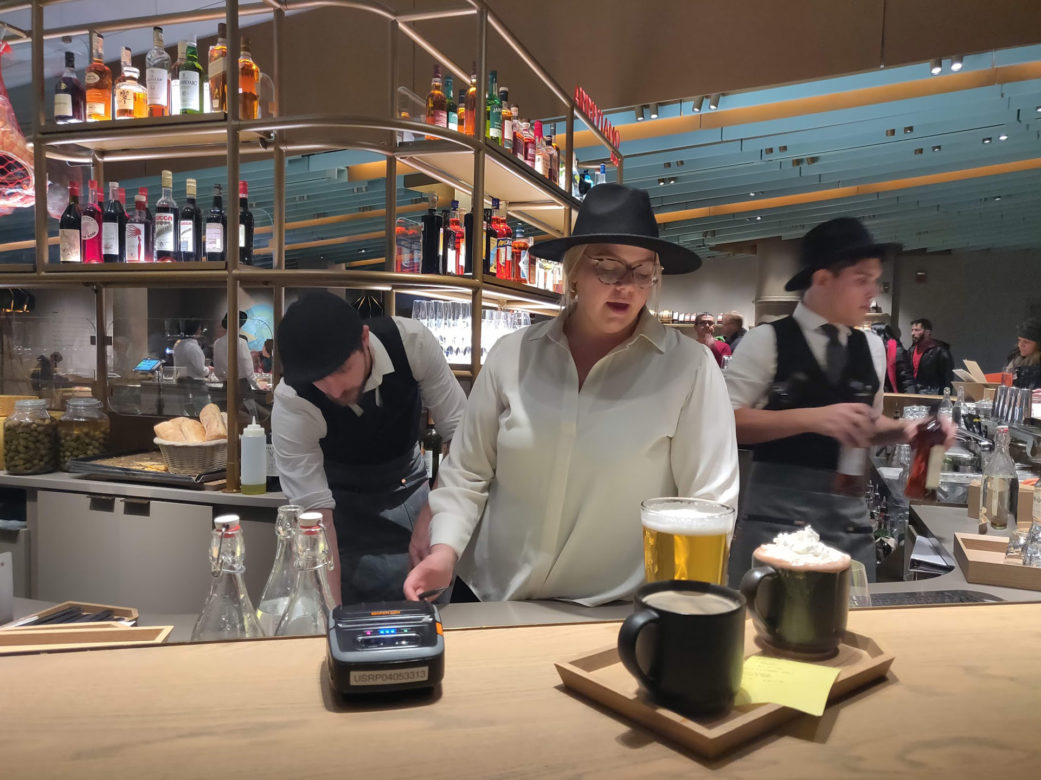
Unfed and unbeaned, I return to the first floor to say goodbye to Charlotte Jackson (there are also a phalanx of Nuova Simonelli Black Eagle espresso machines, but she is the centerpiece). The Master Roaster, whose name is Patrick, explains how Charlotte roasts coffee in batches of 25 pounds for 10-12 minutes, with thermocouples inside her roasting drum monitoring the uniformity of the roast and the integrity of the roast curve; the beans then pass through a spectrometer to ensure they’re the right color for their roast level, then head downstairs to be destoned and de-gassed for seven days, after which they travel via the cask and its pneumatic web to the baristas, who have six days to use them up.
On my way out, I order Patrick’s recommendation: the Hawaii Ka’u, a dark, frank, bitter face-squincher. I buy one for myself and another for a friend I’m meeting afterward, as well as a cannoli to share with her, and I leave the biggest Starbucks in the world to return to my regular-sized existence.
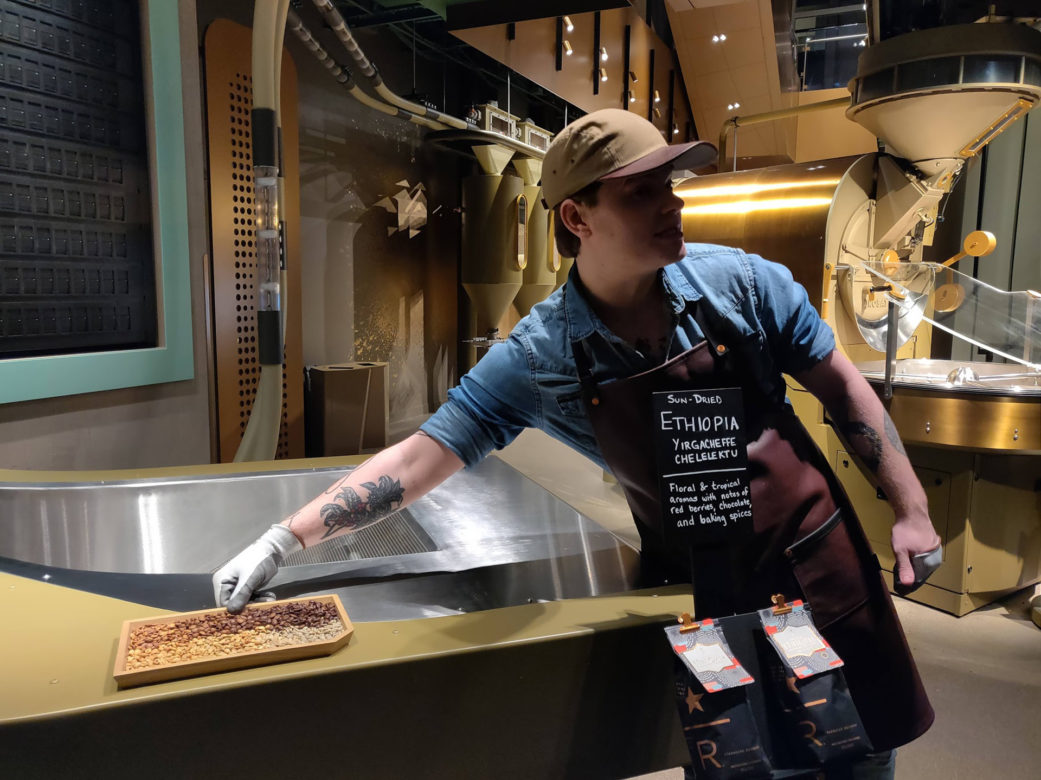
We are now having important national conversations about exactly how big things need to be, specifically things like individual and corporate bank accounts; before my visit, a friend joked that I should search the Roastery for a golden statue of Howard Schultz. “Billionaire,” despite its jaunty French suffix, has no flair; it’s a buffoonish, bloviant word. It feels tightly spherical and self-satisfied, ready to burst under pressure—and indeed, there are more and more questions being asked as to how, exactly, Starbucks has amassed the sort of fortune necessary to build these Brand Experience Palaces.
For what it’s worth I am entirely satisfied with my usual Starbucks in Fulton Market, with its deep comfortable chairs and the Wi-Fi I feel less guilty about hogging than Stumptown’s or La Colombe’s. What I yearn for in a coffee shop is a sanctuary from bigness; I want it to feel like an extension of my home, cozy, contained, intimate. The world seems more manageable when bounded inside the shop, inside my cup.
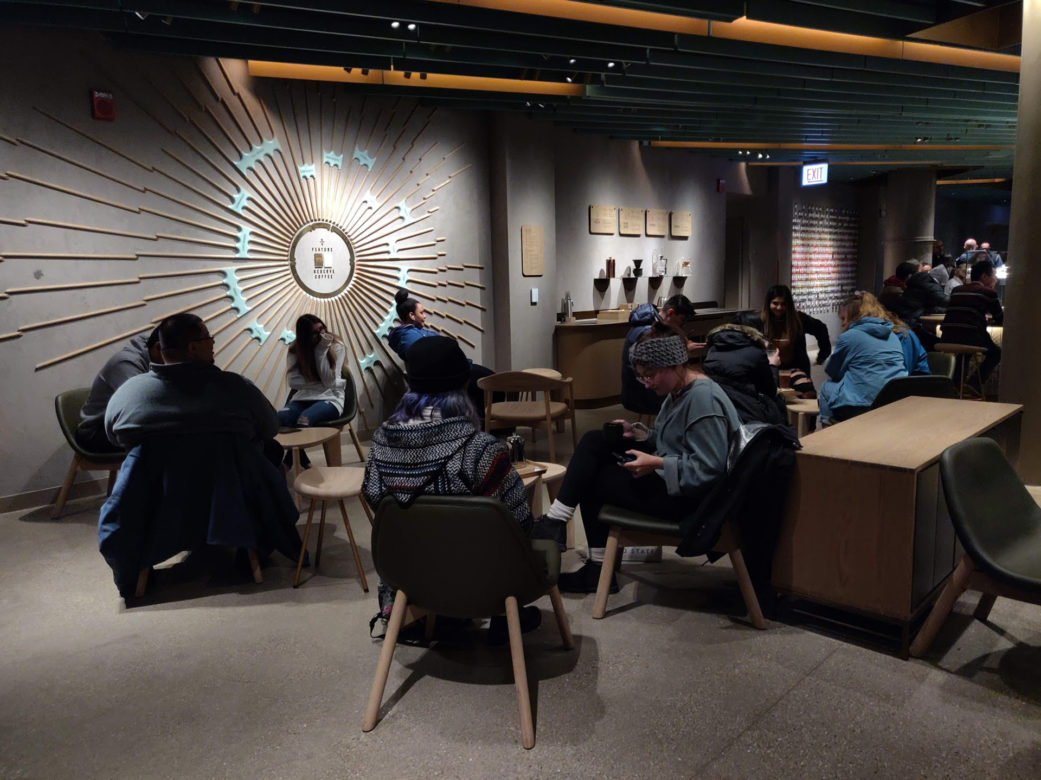
It’s true that, inside the biggest Starbucks in the world, there are nooks and corners to read and hibernate (though nowhere in the building is there an electrical outlet). It’s hard to imagine anyone becoming a regular here; it’s built for tourists and gawkers, for holiday shoppers, for people giving out-of-town friends an Experience (if they have the patience to wait on line). But I’m probably the only one worrying about this. “You know how everyone thinks about Starbucks, like it’s just Starbucks, it’s everywhere,” said a young partner who welcomed me to the top floor. “This is about brand elevation.” He is the same one who explained to me the connection between the four-story cask and the rays of the sun. The sun is going nowhere, at least for now.
Janani Sreenivasan (@jennyvasan) is a comedy writer, filmmaker, and political strategist based in Chicago. Her work has appeared in Reductress, The New Yorker, McSweeney’s, and The Toast. Read more Janani Sreenivasan on Sprudge.
Photos by Janani Sreenivasan for Sprudge Media Network.



